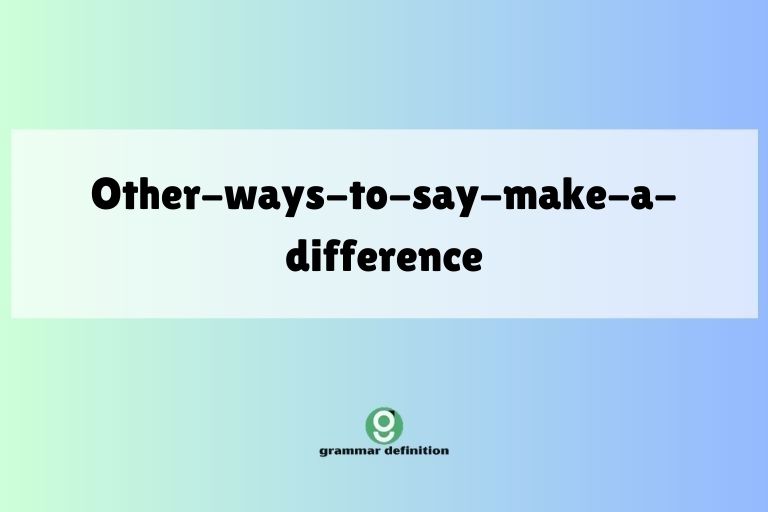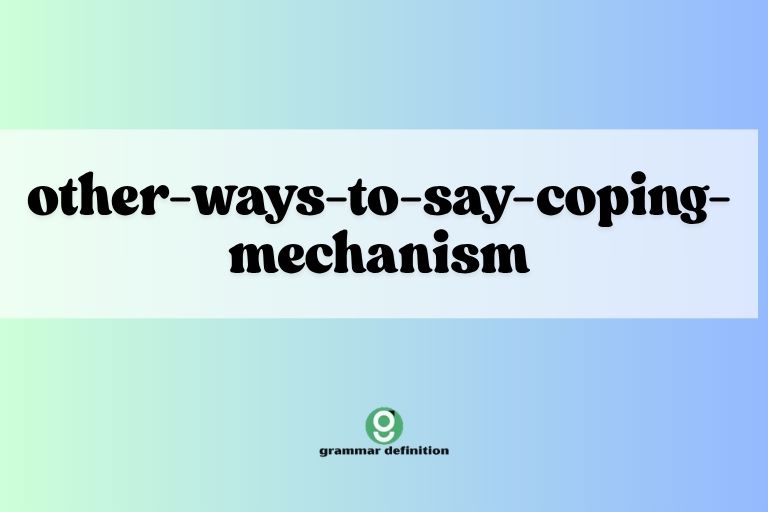Other Ways to Say “Make a Difference”: A Comprehensive Guide

The phrase “make a difference” is a common expression in English, but its frequent use can sometimes make our language sound repetitive. Understanding alternative ways to convey the same meaning is crucial for effective communication, adding nuance, and maintaining listener engagement.
This article explores a wide range of synonyms and related expressions that capture the essence of “making a difference,” enhancing your vocabulary and improving your ability to express yourself with precision. This guide is suitable for English language learners of all levels, from beginners looking to expand their vocabulary to advanced speakers aiming for more sophisticated expression.
Table of Contents
- Introduction
- Definition of “Make a Difference”
- Structural Breakdown
- Types and Categories of Alternatives
- Examples
- Usage Rules
- Common Mistakes
- Practice Exercises
- Advanced Topics
- FAQ
- Conclusion
Definition of “Make a Difference”
The phrase “make a difference” means to have a significant positive impact on something or someone. It implies that an action or contribution has altered a situation or a person’s life for the better.
The term is often used to describe actions that are altruistic, beneficial, or transformative.
In terms of grammar, “make” is a verb, “a” is an article, and “difference” is a noun. The phrase functions as a verb phrase, indicating the action of creating a positive impact.
It is commonly used in contexts where individuals or organizations are striving to improve society, help others, or bring about positive change. The phrase is versatile and can be applied to various situations, from individual acts of kindness to large-scale social initiatives.
The contexts in which this phrase is used are broad, ranging from personal achievements to global endeavors. For example, volunteering at a local soup kitchen is “making a difference” in the lives of those in need.
Similarly, developing a new technology that improves healthcare is “making a difference” on a larger scale. The key is that the action leads to a tangible positive outcome.
Structural Breakdown
The structure of the phrase “make a difference” is relatively straightforward. Let’s break it down:
- Make: This is the main verb, indicating the action of creating or causing something. In this context, it signifies the act of bringing about a change.
- A: This is an indefinite article, specifying that we are talking about a single, unspecified difference.
- Difference: This is the noun, representing the positive change or impact that is being created.
The phrase typically follows a subject-verb-object structure. For instance:
Subject + Verb + Article + Noun
She + made + a + difference.
Variations of this structure can include adverbs or adjectives to further describe the nature of the difference. For example:
He made a significant difference. (adjective ‘significant’ modifies ‘difference’)
They made a difference immediately. (adverb ‘immediately’ modifies ‘made’)
Understanding this structural breakdown can help in recognizing and using alternative phrases that convey the same meaning but with slightly different grammatical constructions.
Types and Categories of Alternatives
There are several categories of alternative phrases that can be used instead of “make a difference,” each with slightly different nuances. These categories help you choose the most appropriate expression for a given context.
Impact-Oriented Phrases
These phrases emphasize the effect or result of an action. They focus on the tangible consequences of one’s efforts.
Examples include: have an impact, leave a mark, exert influence, produce an effect, change the game.
Influence-Oriented Phrases
These phrases highlight the power to affect or sway others. They focus on the ability to shape opinions or behaviors.
Examples include: shape opinions, sway decisions, guide actions, affect outcomes, mold behavior.
Contribution-Oriented Phrases
These phrases emphasize the act of giving or providing something valuable. They focus on the positive additions made to a situation or cause.
Examples include: contribute significantly, add value, play a role, pitch in, offer assistance.
Improvement-Oriented Phrases
These phrases focus on the act of making something better. They highlight the process of enhancing or upgrading a situation or condition.
Examples include: improve conditions, enhance quality, boost morale, refine processes, elevate standards.
Phrases Emphasizing Positive Change
These phrases specifically highlight changes that are beneficial and constructive. They stress the movement towards a more desirable state.
Examples include: foster progress, promote well-being, advance development, encourage growth, generate improvement.
Examples
To illustrate the various ways to say “make a difference,” here are several examples organized by category. Each example demonstrates how the alternative phrase can be used in a sentence, providing context and clarity.
Impact-Oriented Examples
The following table provides examples of impact-oriented phrases used in sentences. These phrases highlight the tangible effects of actions.
| Phrase | Example Sentence |
|---|---|
| Have an impact | Her research had a significant impact on the field of medicine. |
| Leave a mark | His dedication to the community left a lasting mark on everyone he helped. |
| Exert influence | The organization exerted considerable influence on policy decisions. |
| Produce an effect | The new regulations produced a positive effect on the environment. |
| Change the game | Their innovative approach changed the game in the industry. |
| Have a profound effect | The therapist’s guidance had a profound effect on her patient’s recovery. |
| Make an impression | The speaker’s powerful words made a lasting impression on the audience. |
| Create ripples | Her act of kindness created ripples throughout the community. |
| Generate waves | The activist’s speech generated waves of support for the cause. |
| Resonate deeply | The author’s message resonated deeply with readers worldwide. |
| Catalyze change | The new policy catalyzed change within the organization. |
| Trigger transformation | The documentary triggered a transformation in public opinion. |
| Generate momentum | The volunteer efforts generated momentum for the project. |
| Spark innovation | The competition sparked innovation among the participants. |
| Inspire action | The leader’s speech inspired action from the crowd. |
| Mobilize support | The campaign mobilized support from all sectors of society. |
| Shape the future | Their decisions will shape the future of the company. |
| Redefine standards | This technology will redefine standards in the industry. |
| Set a precedent | The court’s ruling set a precedent for future cases. |
| Leave a legacy | Her contributions left a legacy for generations to come. |
| Have far-reaching consequences | The decision had far-reaching consequences for the entire region. |
| Influence events | His strategies influenced events on the global stage. |
| Alter perceptions | The documentary altered perceptions about the issue. |
| Shift paradigms | The new theory shifted paradigms in the scientific community. |
| Transform lives | The charity transformed lives through its programs. |
Influence-Oriented Examples
The following table provides examples of influence-oriented phrases used in sentences. These phrases highlight the ability to affect or sway others.
| Phrase | Example Sentence |
|---|---|
| Shape opinions | The media shapes public opinions on important issues. |
| Sway decisions | His arguments swayed the committee’s decisions. |
| Guide actions | Her mentorship guided his actions throughout his career. |
| Affect outcomes | Their efforts affected the outcomes of the project. |
| Mold behavior | The program molds the behavior of young offenders. |
| Impact attitudes | The campaign impacted attitudes towards environmental conservation. |
| Influence thinking | Her research influenced thinking in the academic community. |
| Affect perceptions | The artist’s work affected perceptions of beauty. |
| Shape beliefs | The educator’s lessons shaped the beliefs of her students. |
| Direct choices | The advertisement directed consumers’ choices towards their product. |
| Affect perspectives | The documentary affected perspectives on social justice. |
| Guide understanding | The teacher’s explanations guided students’ understanding of the concept. |
| Shape viewpoints | The debate shaped viewpoints among the audience members. |
| Affect judgments | The evidence affected the jury’s judgments in the trial. |
| Influence policies | The activist group influenced policies on environmental protection. |
| Shape public discourse | The politician’s speech shaped public discourse on healthcare reform. |
| Affect societal norms | The movement affected societal norms around gender equality. |
| Influence cultural values | The artist’s work influenced cultural values regarding artistic expression. |
| Shape ethical standards | The leader’s actions shaped ethical standards within the organization. |
| Impact moral compass | The mentor’s guidance impacted the student’s moral compass. |
| Affect decision-making | The data affected decision-making within the company. |
| Influence strategic planning | The consultant influenced strategic planning for the business. |
| Shape investment strategies | The analyst’s report shaped investment strategies in the market. |
| Affect economic trends | The policy affected economic trends in the region. |
| Influence global dynamics | The treaty influenced global dynamics between nations. |
Contribution-Oriented Examples
The following table provides examples of contribution-oriented phrases used in sentences. These phrases highlight the act of giving or providing something valuable.
| Phrase | Example Sentence |
|---|---|
| Contribute significantly | She contributed significantly to the success of the project. |
| Add value | His expertise added value to the team’s efforts. |
| Play a role | Volunteers played a crucial role in the disaster relief efforts. |
| Pitch in | Everyone pitched in to help clean up the park. |
| Offer assistance | The organization offered assistance to families in need. |
| Provide support | The community provided support to the victims of the flood. |
| Lend a hand | She lent a hand to her neighbor with the yard work. |
| Make a donation | They made a generous donation to the charity. |
| Offer expertise | He offered his expertise to the startup company. |
| Share knowledge | The professor shared her knowledge with the students. |
| Devote time | She devoted her time to volunteering at the hospital. |
| Invest resources | The company invested resources in research and development. |
| Allocate funds | The government allocated funds to education programs. |
| Commit effort | They committed their effort to improving the community. |
| Dedicate energy | He dedicated his energy to solving the problem. |
| Offer insights | The consultant offered valuable insights to the company. |
| Provide guidance | The mentor provided guidance to the mentee. |
| Lend expertise | The specialist lent his expertise to the project. |
| Share skills | The volunteer shared her skills at the community center. |
| Contribute talents | The artist contributed her talents to the mural project. |
| Offer solutions | The engineer offered innovative solutions to the problem. |
| Provide resources | The organization provided essential resources to the refugees. |
| Lend support | The friends lent their support to each other during the crisis. |
| Share experiences | The veteran shared his experiences with the younger generation. |
| Contribute ideas | The team members contributed creative ideas to the brainstorming session. |
Improvement-Oriented Examples
The following table provides examples of improvement-oriented phrases used in sentences. These phrases highlight the act of making something better.
| Phrase | Example Sentence |
|---|---|
| Improve conditions | The new policies improved working conditions for employees. |
| Enhance quality | The new technology enhanced the quality of the product. |
| Boost morale | The team-building activities boosted morale among the staff. |
| Refine processes | The company refined its processes to increase efficiency. |
| Elevate standards | The new regulations elevated standards in the industry. |
| Optimize performance | The tuning optimized the performance of the engine. |
| Upgrade infrastructure | The city upgraded its infrastructure to handle increased traffic. |
| Advance knowledge | The research advanced knowledge in the field. |
| Strengthen relationships | The communication skills training strengthened relationships within the team. |
| Develop skills | The course developed valuable skills for the students. |
| Enhance capabilities | The software enhanced the capabilities of the hardware. |
| Refine techniques | The artist refined her techniques over the years. |
| Elevate expectations | The success elevated expectations for future projects. |
| Optimize efficiency | The new system optimized efficiency in the workplace. |
| Upgrade technology | The company upgraded its technology to stay competitive. |
| Advance understanding | The lecture advanced understanding of the topic. |
| Strengthen cooperation | The agreement strengthened cooperation between the two countries. |
| Develop expertise | The training developed expertise in the new technology. |
| Enhance productivity | The new tools enhanced productivity in the department. |
| Refine strategies | The organization refined its strategies to achieve its goals. |
| Elevate performance | The coaching elevated the team’s performance. |
| Optimize resource allocation | The management optimized resource allocation for the project. |
| Upgrade equipment | The hospital upgraded its equipment with the latest technology. |
| Advance progress | The innovations advanced progress in the industry. |
| Strengthen foundations | The program strengthened foundations for future development. |
Positive Change Examples
The following table provides examples of phrases emphasizing positive change used in sentences. These phrases specifically highlight changes that are beneficial and constructive.
| Phrase | Example Sentence |
|---|---|
| Foster progress | The new policies foster progress in education. |
| Promote well-being | The community programs promote well-being among residents. |
| Advance development | The investments advance development in the region. |
| Encourage growth | The mentorship program encourages growth among young professionals. |
| Generate improvement | The reforms generated improvement in the healthcare system. |
| Cultivate positivity | The leadership cultivates positivity in the workplace. |
| Nurture potential | The school nurtures the potential of its students. |
| Inspire hope | The charity’s work inspires hope in impoverished communities. |
| Spark transformation | The movement sparked transformation in societal attitudes. |
| Drive advancement | The research drives advancement in the field of medicine. |
| Propel innovation | The funding propels innovation in the technology sector. |
| Fuel progress | The collaboration fuels progress towards sustainable development. |
| Advance equity | The policies advance equity in the workplace. |
| Promote inclusion | The organization promotes inclusion in its programs. |
| Foster understanding | The cultural exchange fosters understanding between nations. |
| Cultivate empathy | The program cultivates empathy among participants. |
| Nurture compassion | The volunteer work nurtures compassion for others. |
| Inspire change | The activist’s speech inspired change in the community. |
| Spark progress | The initiative sparked progress towards environmental sustainability. |
| Drive development | The investments drive development in infrastructure. |
| Propel growth | The training propels growth in professional skills. |
| Fuel innovation | The research fuels innovation in the scientific community. |
| Advance equality | The legislation advances equality in the legal system. |
| Promote justice | The organization promotes justice for marginalized groups. |
| Foster collaboration | The project fosters collaboration between different departments. |
Usage Rules
While the phrases discussed are generally interchangeable with “make a difference,” there are some nuances to consider. The specific context and the desired emphasis will influence the best choice.
- Formality: Some phrases, like “exert influence” or “contribute significantly,” are more formal than “pitch in” or “lend a hand.”
- Specificity: Some phrases are more specific. For example, “improve conditions” is more specific than “have an impact.”
- Emphasis: Consider what you want to emphasize. If you want to highlight the lasting effects, “leave a mark” might be more suitable than “play a role.”
It’s also important to ensure grammatical correctness. The chosen phrase should fit seamlessly into the sentence structure.
For example, “She significantly contributed” is grammatically incorrect; it should be “She contributed significantly.”
Pay attention to prepositions. Some phrases require specific prepositions. For example, “have an impact on” and “contribute to.” Using the wrong preposition can change the meaning or make the sentence grammatically incorrect.
Common Mistakes
One common mistake is using a phrase that doesn’t quite fit the context. For example, saying “He changed the game” when referring to a minor improvement is an overstatement.
Another mistake is improper verb tense. For example, “She will makes a difference” is incorrect.
The correct form is “She will make a difference” or “She will have an impact.”
Misusing prepositions is also a frequent error. Examples include:
| Incorrect | Correct |
|---|---|
| He had an impact to the community. | He had an impact on the community. |
| She contributed in the project. | She contributed to the project. |
Avoiding these common mistakes will help ensure that your communication is clear, accurate, and effective.
Practice Exercises
Test your understanding with the following exercises. Choose the best alternative phrase for “make a difference” in each sentence.
- The volunteer work _______ to the lives of many people.
- made a difference
- left a mark
- pitched in
- swayed decisions
- Her research _______ on the development of new treatments.
- made a difference
- had an impact
- refined processes
- shaped opinions
- The new program is designed to _______ among young students.
- make a difference
- improve conditions
- encourage growth
- contribute significantly
- His leadership _______ on the company’s strategic direction.
- made a difference
- exerted influence
- boosted morale
- added value
- The organization _______ to families affected by the disaster.
- made a difference
- refined processes
- offered assistance
- changed the game
- The new technology _______ of the existing systems.
- made a difference
- enhanced the quality
- shaped opinions
- left a mark
- The new policies _______ of the workplace.
- made a difference
- improved conditions
- swayed decisions
- had an impact
- The training course is designed to _______ among employees.
- make a difference
- develop skills
- shaped opinions
- offered assistance
- The company’s sustainability efforts _______ on the environment.
- made a difference
- improved conditions
- had a profound effect
- left a mark
- The program aims to _______ among underprivileged youth.
- make a difference
- nurture potential
- improve conditions
- affect outcomes
Answer Key:
- b
- b
- c
- b
- c
- a
- b
- b
- c
- b
Advanced Topics
For advanced learners, consider exploring idiomatic expressions that convey similar meanings. These expressions often add color and depth to your language.
For example, “move the needle” means to make significant progress. “Turn the tide” means to reverse a negative trend.
“Make waves” means to cause a stir or create a significant impact, often in a disruptive way.
Also, explore the use of figurative language, such as metaphors and similes, to express the idea of making a difference. For example, “Her work was a beacon of hope” conveys the idea of providing guidance and inspiration.
Understanding the cultural context is also important. The specific language used to describe positive impact may vary across different cultures and communities.
Be mindful of these nuances to ensure your communication is culturally sensitive and appropriate.
FAQ
- Q: Is “make a difference” always positive?
A: Yes, “make a difference” generally implies a positive impact. If you want to describe a negative impact, you would use phrases like “make things worse” or “have a negative effect.”
- Q: Can I use “make a difference” in a formal setting?
A: Yes, but consider the audience. In very formal settings, a more sophisticated phrase like “contribute significantly” or “have a substantial impact” might be more appropriate.
- Q: What’s the difference between “impact” and “influence”?
A: “Impact” refers to the direct effect or result of an action, while “influence” refers to the power to affect or sway others’ decisions or behaviors. Impact is a broader term, while influence is more about affecting people specifically.
- Q: How can I improve my vocabulary for expressing positive impact?
A: Read widely, pay attention to the language used in articles and speeches about social issues, and practice using different phrases in your own writing and speaking. Also, use a thesaurus to find synonyms and related expressions.
- Q: Are there any phrases I should avoid?
A: Avoid clichés and overused phrases that have lost their impact. Also, be careful with jargon or technical terms that your audience may not understand.
- Q: How do I know which phrase is the most appropriate?
A: Consider the context, the audience, and the specific nuance you want to convey. Think about the specific type of impact you’re describing (e.g., improving conditions, influencing opinions, contributing resources) and choose a phrase that reflects that.
- Q: Can “make a difference” be used ironically?
A: Yes, it can be used ironically to highlight situations where someone’s actions have had the opposite of the intended positive effect. However, this should be done carefully to avoid misunderstandings.
- Q: What are some common collocations with “make a difference”?
A: Some common collocations include “make a real difference,” “make a significant difference,” “make a positive difference,” and “make a lasting difference.” These collocations add emphasis and specificity to the phrase.
Conclusion
Mastering alternative ways to say “make a difference” is essential for enhancing your communication skills and expressing yourself with greater precision. By understanding the nuances of impact-oriented, influence-oriented, contribution-oriented, and improvement-oriented phrases, you can choose the most appropriate expression for any given context.
Remember to consider the formality, specificity, and emphasis you want to convey.
Practice using these alternative phrases in your writing and speaking to solidify your understanding. Pay attention to the specific prepositions and grammatical structures associated with each phrase.
By avoiding common mistakes and continuously expanding your vocabulary, you can effectively communicate the positive impact of actions and contributions.
Ultimately, the ability to articulate the significance of positive change is crucial for inspiring others and driving progress. Continue to explore new expressions and refine your language skills to become a more effective and impactful communicator.






